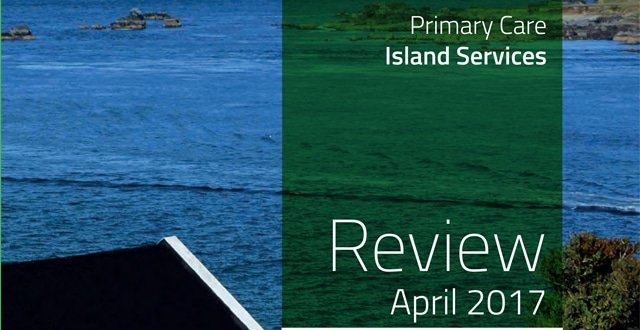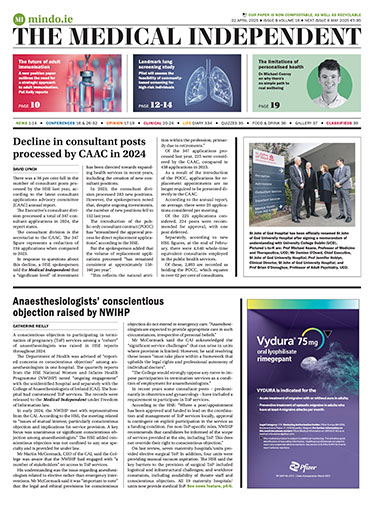Telemedicine services, the introduction of island public health nurses and primary care team healthcare delivery are just some of the recommendations set out in the HSE’s Primary Care Island Services Review April 2017.
The review was completed last year, but was only recently published by the HSE.
In fact, it was originally due to be completed in 2015. For the past year and a half it has been undergoing a “costing exercise”.
After numerous delays, the 138-page review promises much and has been broadly welcomed by islanders and healthcare providers keen to see an improvement in healthcare services.
The review reiterates the Government’s pledge to protect and support island populations. Furthermore, it restates official healthcare policy to provide care to individuals as close to home as possible.
Delivering on these objective is not impossible but clearly presents challenges. An entirely new approach is required to ensure islanders can access the same healthcare as those on the mainland, the review concludes.
The report finds a “disorganised, inefficient and disjointed health and social care service that does not recognise the additional challenges that islanders must sometimes face in order to receive the same level of healthcare as that of a person on the mainland”.
In the face of such a chaotic service, however, healthcare professionals continue to work tirelessly to meet the needs of patients.
“GPs and island nurses, along with other members of the primary care team, are working relentlessly to provide islanders with an adequate health and social care service against a backdrop of limited resources and a distinct lack of forward workforce planning,” the review states.
“Such a model of care is unsustainable going forward and the populations of the islands, along with their healthcare workers, have called for this long-standing issue to be imminently addressed.”
Some 18 islands are included in the review. In total 2,846 people reside on the islands, 47 per cent of whom are female and 53 per cent of whom are male.
A “one-size-fits-all” approach is not appropriate and instead it is recommended that a “specific island forum” be established for each island to deliver a “specific plan”.
A health needs assessment should be performed in order to identify the unmet healthcare needs for each island.
There is much work yet to be done, therefore, to not only deliver on the more than 70 recommendations set out in the review but to further ensure the healthcare needs of each island are catered for appropriately in the future. A national forum will be convened and tasked with implementing all recommendations.
Dr Kevin Quinn, GP, Arranmore Island, Co Donegal, broadly welcomed the review, but cautioned that “the proof, as usual, will be in the pudding”.
He said the review re-establishes local accountability to the provision of services on islands, which was lost when the old health boards structure was disbanded.
“The key areas that have greatest concern to me are workforce planning, recruitment and retention. There is recognition of this in the report and hopefully [the recommendations] will be put into action,” Dr Quinn told the Medical Independent.
“The provision and maintenance of infrastructure particularly in relation to IT communication, equipment and premises is vitally important and as the cost of IT provision and maintenance is high with low populations, will need public investment.”
The report acknowledges these concerns, stating that “cuts to funding, difficulties with recruitment and retention of staff, a deficiency in infrastructural supports, the provision of emergency cover and the cost of providing locum cover all threaten the viability of providing a high quality primary care service to island communities”.
Dr Quinn welcomed the fact that “at last” the different roles undertaken by GPs and public health nurses in isolated island regions were recognised in the review.
A specific job description for island public health nurses is planned and the role of island nurses in dispensing medications on islands will be developed.
Overall, Dr Quinn said: “I believe in the north west area there is a recognition and commitment to maintain and develop services and [I] look forward to the implementation within the proposed frameworks.”
The review calls on the ICGP to work with the HSE to identify the training needs of island GPs. It says the GP training curriculum should “reflect the extended range of services that GPs are required to provide to island communities”.
It also calls for adequate locum cover for island GPs to allow them to take leave and attend training. But given mainland GPs already have huge difficulty sourcing locums, achieving this objective could be difficult.
Telemedicine services facilitating video link consultations are proposed while access to shared electronic records is recommended for primary care teams.
Unfortunately, the success of this objective will hinge on the development of broadband on islands, which could yet be many years away.













Leave a Reply
You must be logged in to post a comment.